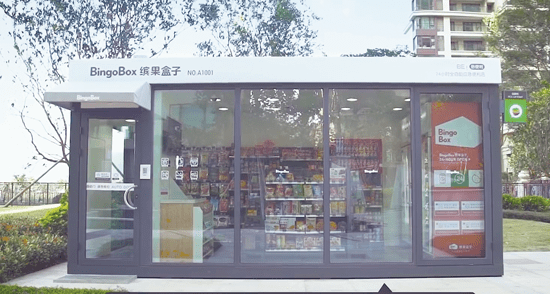With the increasing popularity of facial recognition technology, business intelligence software and mobile payments in China, online retailers are moving from the web to the physical world by opening stores that are as self-service as their websites.
Zhongshan BingoBox technology Co. is among the pioneers, having opened 10 self-checkout convenience stores it calls Box since June 2016.
The stores have no employees. Consumers scan a QR code on their smartphones to enter a store and check out at self-service registers with Alipay or WeChat Pay, two popular Chinese online payment options. Products carry wireless radio frequency identification (RFID) tags that identify what each consumer is buying without the shopper scanning each item, reducing the time needed to check out.
The company opened its first store in Zhongshan, a Chinese city of 3 million residents in southern China, and BingoBox says tens of thousands of consumers have visited the store, with 80% of orders coming from repeat customers. Theft has not been a problem, according to the company.

An unstaffed BingoBox convenience store.
Before moving into bricks and mortar, BingoBox primarily sold fruit online to consumers in five cities, and it moved into offline self-service to facilitate order pickup. “We created many lockers near residential buildings so that consumers can pick up the products they ordered online on their way home. The strong demand from those lockers inspired us to invent Box, which aims to make it easier for consumers to shop,” founder and CEO Chilam Chan tells Internet Retailer.
The company plans to open 5,000 automated-checkout stores in the next 12 months, focusing on high-end residential communities or college campus.
The operating costs of an automated store are less than one-eighth that of a traditional convenience stores, Chan says. “The cost of operating a Box, include rent, labor, electricity, internet, etc., is less than 2,500 yuan ($375) per month,” Chan says.
The store looks like a small mobile home with a floor-to-ceiling glass window. It covers about 20 square meters (215 square feet) and carries about 500 items, including sodas, potato chips and household goods.
Mobile payments have become mainstream for online payment in China, and 71% of Alipay online payment transactions in 2016 were done through a mobile phone, according to Alipay’s operator Ant Financial Service Group. Ant Financial is affiliated with China’s leading e-commerce company, Alibaba Group Holding Ltd.
Convenience stores are growing rapidly in China, making them a likely choice for testing new retail technology. Convenience store sales increased by 14% in 2016, compared with overall retail market growth of only 10.9%, according to China’s Ministry of Commerce.
China’s two biggest online retail companies, Alibaba and JD.com Inc., No.1 in the Internet Retailer China 500, also have announced unmanned store tests as they seek to increase sales from offline channels.
Alibaba recently launched an unmanned coffee shop in China that uses RFID technology and mobile payment technology that’s similar to what BingoBox employs. (While Alibaba’s big online marketplaces account for about three-quarters of online retail purchases in China, Alibaba is not ranked in the China 500 because it is not the merchant of record for any of the sales on sites like Taobao and Tmall.)
In the United States, Amazon.com Inc., No. 1 in the Internet Retailer 2017 Global 1000, is testing a cashier-less store in Seattle called Amazon Go where Amazon employees can shop for groceries and prepared food. “I am super happy about the news of Amazon Go, because before people seldom would believe what I do is possible,” Chan says.
French retailer Groupe Auchan SA and several venture capital firms, including GGV Capital, invested 100 million yuan ($15 million) in BingoBox in a series A financing round in July.
Favorite